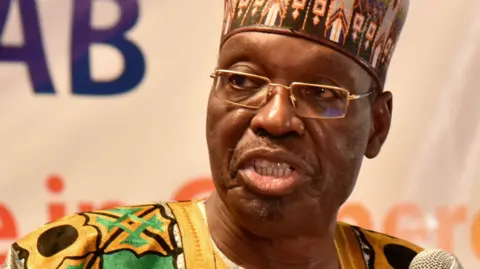Ally of Cameroon president, 92, quits 'broken' government to challenge him
 Anadolu Agency via Getty Images
Anadolu Agency via Getty ImagesIssa Tchiroma Bakary - a prominent minister and long-time ally of President Paul Biya - has quit Cameroon's government, in the hope of ending 92-year-old Biya's four-decade grip on power in upcoming elections.
Just four months before the central African nation goes to the polls, Tchiroma said the Biya administration he belonged to had "broken" public trust and he was switching to a rival party.
"A country cannot exist in the service of one man," he said on Wednesday.
While he was communications minister, Tchiroma notably came under fire for denying - then backtracking on his denial - that Cameroonian soldiers had killed women and children in a viral video verified by BBC Africa Eye.
His other roles during almost two decades in government include being a spokesman for the Biya government, and, until his resignation on Tuesday, he was employment minister.
Paul Biya - the world's oldest head of state - has yet to confirm if he will attempt an eighth term as president. Last year, the country banned reports on the president's health following rumours he had died.
As this election approaches, high unemployment and soaring living costs are of concern to many Cameroonians, as are corruption and security. A separatist insurgency in the English-speaking provinces as well as jihadists operating in the northernmost region have forced many thousands of Cameroonians from their homes in the past decade.
Cracks in Tchiroma's relationship with President Biya were blown open earlier this month, when he told crowds in his home city of Garoua that Biya's time in power had not benefitted them in any way.
Tchiroma, widely reported to be 75, continued this criticism in a 24-page manifesto released a day after his resignation - promising to dismantle "the old system" so that Cameroon could move beyond "abuse, contempt, and the confiscation of power".
One of his proposed solutions is federalism - he is offering to hold a referendum on devolving more power to Cameroon's 10 provinces. This has long been mooted by many as a solution to the country's so-called Anglophone crisis.
Specifically addressing English-speaking Cameroonians, who have long complained of marginalisation and discrimination in Francophone-dominated public institutions, he said "you do not need people to speak for you - you need to be listened to" and that "centralisation has failed".
Tchiroma also used his manifesto to say Cameroon "has been ruled for decades by the same vision, the same system. This model, long presented as a safeguard of stability, has gradually stifled progress, paralysed our institutions, and broken the bond of trust between the state and its citizens".
As the October presidential election approaches, rights groups have condemned the government's crackdown on dissent.
Shortly after Tchiroma announced his plans to run for the presidency, the government reportedly announced a ban on all political activities by his Cameroon National Salvation Front (CNSF) party in a sub-district of the Far North region - a part of the country where he is said to be an influential power-broker.
Weeks earlier, fellow presidential hopeful Maurice Kamto had his movements curtailed during a two-day police stakeout in Douala, after promising supporters at a rally in Paris that he would protect Biya and his family if he wins in October.
Parliamentary elections that were also supposed to take place earlier this year have been delayed until 2026.
Reaction to Tchiroma's presidential bid has been mixed - some think he is canny.
"By positioning himself as the elder statesman who 'saw the fire coming', Tchiroma is hedging that his break with Biya will be seen as bold - not opportunistic," Cameroonian analyst and broadcaster Jules Domshe told the BBC.
"From economic fallout to youth unemployment, insecurity, and growing unrest in the North-West, South-West, and Far North [regions], Cameroon is ripe for change."
Opposition voices are divided - some want Tchiroma to support Kamto, who was the runner-up in 2018 with 14% of votes. But others say he is tainted by his long association with Biya.
"He cannot embody change... He was part of the system for too long. The youth do not trust him," says Abdoulaye Harissou, a legal notary and prominent critic once detained by the government.
Another member of the opposition - Jean Michel Nintcheu of the APC coalition - simply said: "We don't see Tchiroma as a potential winner."
More BBC stories on Cameroon:
 Getty Images/BBC
Getty Images/BBCGo to BBCAfrica.com for more news from the African continent.
Follow us on Twitter @BBCAfrica, on Facebook at BBC Africa or on Instagram at bbcafrica
